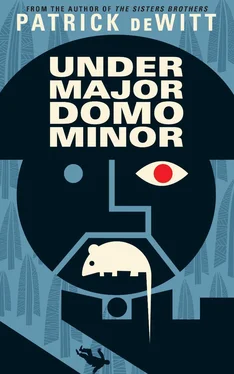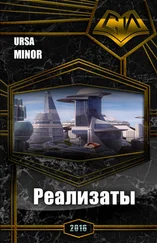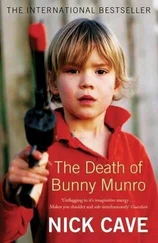The soldiers were stifling laughter, as was the exceptionally handsome man, and Lucy stood by, considering the enigmatic nature of charisma. If he could change a single thing about himself, it would be to possess that atypical lustre certain people were blessed with. The exceptionally handsome man was rich with it, and in witnessing and identifying this, Lucy experienced both covetousness and admiration. He watched the man whisper into one of his soldiers’ ears; the soldier nodded and saluted before hurrying away into the woods. Now the exceptionally handsome man spoke again to Lucy, only all of the playfulness from the moment before had gone:
“Do you have any food?”
“No.”
“A biscuit, perhaps? Or a piece of cheese?”
“Nothing whatsoever, sir, no.”
“Any money?”
“I have a very small amount of money.”
“May we have it?”
“It’s all I’ve got, sir.”
The exceptionally handsome man stepped closer, gripping his bayonet, and there entered into his voice an emotionless, droning tone. “May we or may we not have the money, Lucy from Bury?”
Lucy handed over his small purse of coins, and the exceptionally handsome man emptied it into his palm.
“This is all you have?”
“Yes.”
“This is all you have in the world?”
“Yes.”
The exceptionally handsome man returned the coins to the purse, sulkily stuffing this into his coat pocket. He appeared to take Lucy’s insolvency personally, and a cumbersome quiet came between them. Lucy was casting about in his mind for some bit of chit-chat when the soldier who had gone on scout returned, whispering in the exceptionally handsome man’s ear. The exceptionally handsome man received the news, then addressed the others, who stood at attention, ready to receive his instruction. “All right, we’re heading back to base camp in a single push. The bastards are up to something or I miss my guess, so let’s stay on our guard. Are we up for it, yes or no?” The soldiers called back in a single voice that shocked Lucy with its volume and alacrity: “Aye!” And then, just as quickly as they’d come, they departed, with their leader bringing up the rear.
Rounding the corner of the castle, he ceased walking, as though plagued by an unknown anxiety. Turning, he levelled his rifle at Lucy; his expression was stony, and Lucy once more found himself concerned for his own safety. But there was no danger; the rifle was raised higher, and higher still, and now the exceptionally handsome man took aim and fired his weapon. The bullet ricocheted off the hip of the bell and the peal pulsed in the air, this mingling with the echo of the rifle’s discharge. As Lucy was standing under the bell itself it was as though the noise created something physical surrounding him, a chamber of vibration and sound. Looking upwards, he watched the bell’s slow, circular sway. When he looked back down, the exceptionally handsome man was gone.
After some minutes, the door was unbolted from the inside. It budged a laborious half inch, then another. Lucy couldn’t see who was responsible for these efforts, but there came from the black crack a wispy, whispering voice:
“Who’s there?”
“Lucien Minor, sir.”
“Who?”
“Lucy, sir. I’m reporting to my post under a Mr Olderglough. Is that you?”
“Mmmm,” said the voice, as if unsure.
“I’m happy to make your acquaintance. Thank you again for the position. I’m eager to begin my appointment, and I should think you won’t regret taking me —”
Lucy heard the distant pop of a rifle discharging. It was a miniature and cotton-wrapped sound, and he wondered at the chasm separating the quaintness of this noise and the actuality of a hurtling bullet. There came another report, and a pause; now there followed a rushing crescendo of pops, like a handful of tacks strewn over hardwood. Lucy’s feet were numb, and his stomach felt airy and scooped out.
“May I come in, sir?”
The voice uttered a reply but Lucy couldn’t make it out.
“What was that?” he asked.
The voice rose to a shriek: “Push the fucking door!”
Lucy’s recovery from the directive was admirable and timely. He pushed with all his strength; the heavy door hesitated, then swept slowly, evenly open.
Mr Olderglough stood in the underlit entryway, an elegantly skeletal man of sixty or more outfitted in a suit of black velvet. His white hair was uncombed or unsuccessfully combed; a lock spiralled past his brow and over his eyes, to roguish effect. His right arm hung in a sling, his fingers folded talon-like, nails blackened, knuckles blemished with scabs and blue-yellow bruising. Bowing a bow so slight it hardly amounted to a bow at all, he said, “I apologize, young man, for my vulgarity of a moment ago. I woke up in a foul mood this morning, and the world’s been against me ever since.”
“I’m sorry to hear that, sir.”
“I had a terrific nightmare, is what.” Mr Olderglough leaned in. “Eels,” he said.
“Eels, sir?”
“That was what the dream was about.” But he offered no further information regarding the eels, no description of what malice they had represented. Lucy made no enquiries about it, the reason being that he didn’t wish to know any more. As his eyes became accustomed to the darkness, now he saw that Mr Olderglough’s attire, which had appeared so regal at the start, was actually quite scruffy — buttons mismatched, and stains illustrating his lapels. Lucy thought he looked like an aesthete chasing a run of foul luck. Pointing at the sling, he asked,
“Have you had an accident, sir?”
Mr Olderglough stared at his hand with what Lucy took for regret. “No, not an accident,” he answered, and now he lay his left hand atop his injured right and began to stroke it consolingly, which summoned in Lucy a revulsion he couldn’t put words to. Mr Olderglough emerged from his reverie and asked if Lucy would like a tour of the estate; before Lucy could answer, the man tottered away down the darkening corridor. Lucy followed after, not because he wanted to particularly, but because he could think of no other option, and because he didn’t like the idea of standing alone in the dim, dank place. Other than the stillness of the air it was not noticeably warmer inside the castle, and he did not unbutton his coat.
Mr Olderglough was not an enthusiastic guide. “This is a room,” he said, pointing as they passed. “Not much use for it these days. Better not to go in at all, is my thought. And here, here too is a room, just a room, serving no purpose whatsoever.”
In fact, most every space in the castle was not in use, and the property in general had fallen into disrepair: the furniture was covered with canvas, the heavy velvet curtains drawn, and clumps of dust had built up in the corners and doorways. None of the fireplaces they passed were in use, and Lucy asked,
“Do you never light a fire, sir?”
“I wouldn’t say never. I’ll admit that it’s rare. Room.”
“I wonder,” said Lucy, “on what occasion do you light one?” For the deeper they travelled into the castle, the more the temperature fell, with the light growing dimmer all the while.
“I avoid them, myself,” Mr Olderglough answered. “It seems I get nothing done with a fire going other than have a fire going. The notion of reading by the hearth is pure farce, so far as I’m concerned. Every half a page I have to set my book aside to nurture the flames — not at all my idea of a relaxing evening.” He gave Lucy a reproachful look. “You’re not cold, are you?”
“I am not warm, sir.”
“Well, if you’re after a fire, you may be my guest. But you’ll have to forage your own wood, as the little we have stocked goes to the scullery stove.”
Читать дальше












